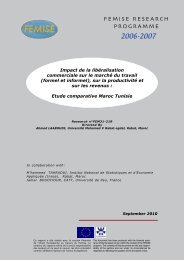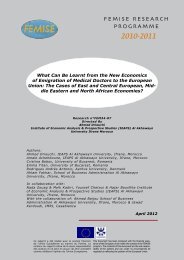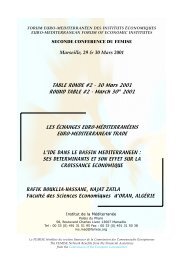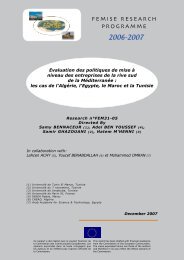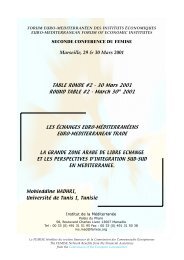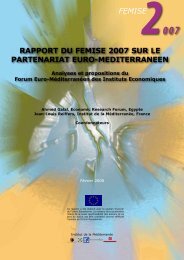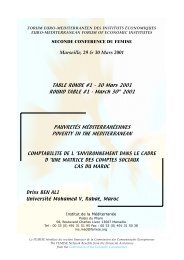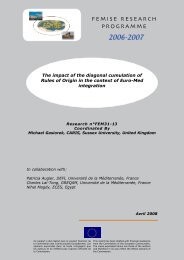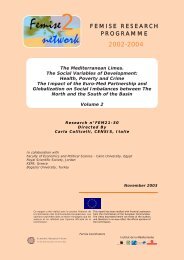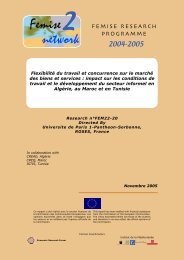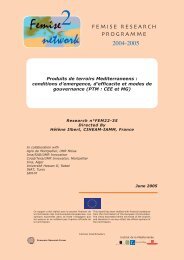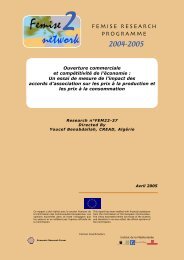PDF, GB, 139 p., 796 Ko - Femise
PDF, GB, 139 p., 796 Ko - Femise
PDF, GB, 139 p., 796 Ko - Femise
You also want an ePaper? Increase the reach of your titles
YUMPU automatically turns print PDFs into web optimized ePapers that Google loves.
foreseen to take effect in 2005. However, it encountered delays in entering into force due to<br />
the slow ratification process by some countries and eventually came into force only in 2007. 23<br />
The Agadir Agreement is seen as a stepping stone to the formation of a well functioning<br />
regional trade agreement that would complement on-going trade liberalization with the EU<br />
and eventually lead to the creation of the EUROMED. However, at this stage it is too early to<br />
evaluate its effectiveness. Nevertheless, it is possible to evaluate empirically at least the<br />
effectiveness of those bilateral trade agreements concluded among the MENA countries in the<br />
late 1990s that later laid the foundations for the Agadir Agreement.<br />
The effectiveness of these bilateral agreements has been frequently questioned in the literature<br />
but to the best of our knowledge there were no previous formal attempts to verify their<br />
effectiveness empirically. Therefore, in addition to studying the effectiveness of the Euro-<br />
Mediterranean Association Agreements we also study the effectiveness of bilateral trade<br />
agreements of the particular Agadir countries to check whether these claims are really<br />
justified.<br />
Other agreements by MENA countries<br />
Most MENA countries in addition to the EU Association Agreements concluded at about the<br />
same time also free trade agreements with the EFTA countries that along with the EU form<br />
the European Economic Area since 1994. The EFTA agreements with the MENA countries<br />
that were in force during the period covered by our sample include Turkey (1992), Israel<br />
23<br />
The declared goals of the Agadir Agreement in addition to the elimination of tariffs include also<br />
harmonization of laws in economic matters and coordination of sectoral and global economic policies, especially<br />
in the fields of international trade, agriculture, industry, finance, taxes and customs. A key element of the Agadir<br />
Agreement is the adoption of the Euro-Mediterranean Protocol on the rules of origin that allow MENA countries<br />
to benefit from diagonal cumulation of value added. In contrast to the US rules of origin that consider value<br />
added domestically in the country that exports to the US this means that it turns the blind eye to where value was<br />
added for the purpose of preferential tariffs as long as it was in an FTA partner country. These conflicting<br />
regimes give the EU an advantage in its competition with the US to a secure the Euro-Mediterranean FTA as a<br />
counter force to the US-Middle East FTA.<br />
48



